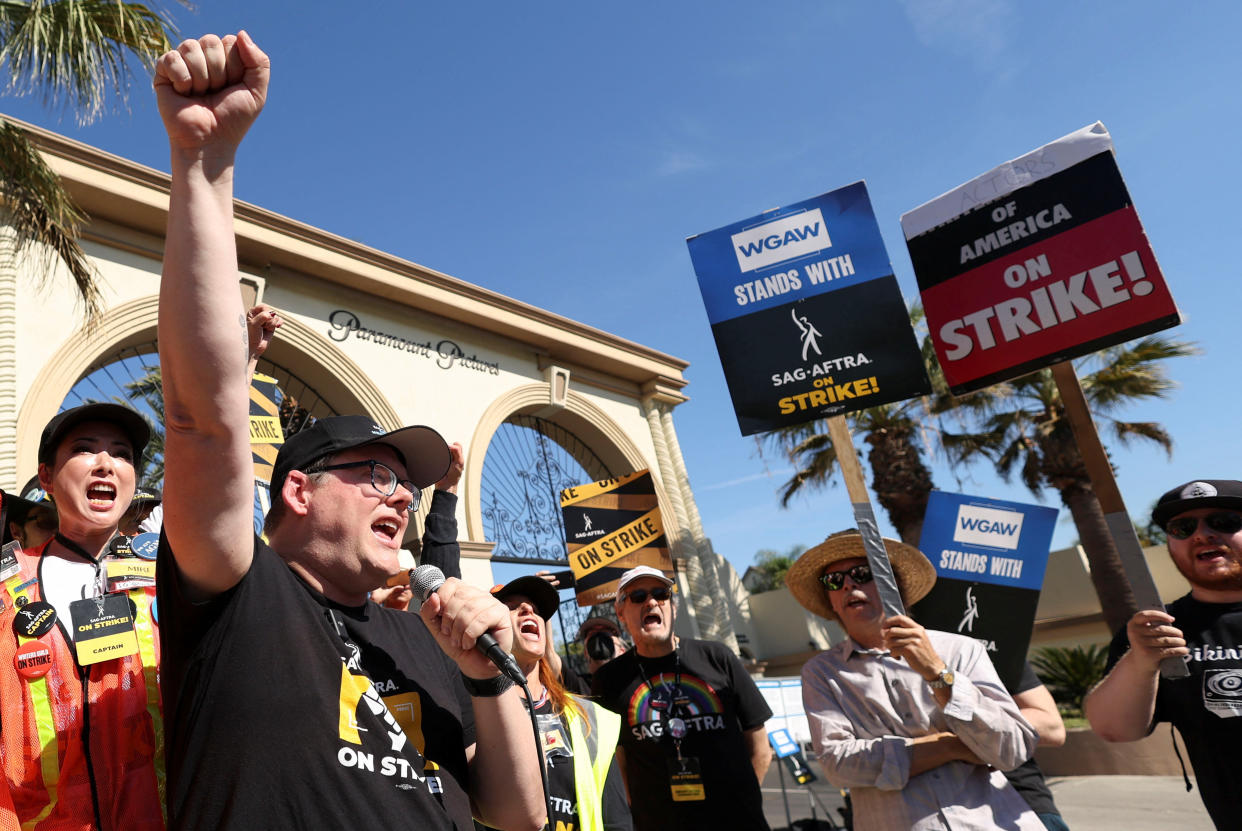Hollywood actors to vote on strike deal after 86% union board approval
SAG-AFTRA's national board revealed Friday it approved the tentative deal struck earlier this week with Hollywood studios to end the historic 118 day actors strike — the longest in its history.
The deal, however, did not receive a unanimous vote with only 86% of board members approving the package. It now heads to the union's member base, who will vote on whether to ratify the contract over the next few weeks.
In a press conference, which was delayed about 90 minutes, SAG-AFTRA national executive director Duncan Crabtree-Ireland said, "This victory is everyone’s victory."
The union said the contract, valued at over $1 billion, includes "above-pattern" minimum compensation increases, with a 7% general wage hike that "breaks the industry pattern," according to Crabtree-Ireland. Background actors will receive immediate pay increases of 11%.
Those minimum wages will increase by another 4% in 2024 and then by another 3.5% in 2025.
There will also be "unprecedented" provisions when it comes to protections surrounding the use of artificial intelligence. According to the guild, members will receive "informed consent and fair compensation" for the creation and use of "digital replicas of members."
"If we didn’t get [AI protections], then what are we doing?" said SAG-AFTRA president Fran Drescher. "We’re not really able to protect our members in the way that they needed to be protected. ... If we didn’t get those barricades, what would it be in three years?"
Additionally, for the first time, there will be a roughly $40 million-per-year streaming residual bonus for actors on shows that reach a certain level of success. Pension and health caps were also "substantially raised."
Other highlights include a 200% increase to improvements to relocation allowances, new terms for hair and makeup that protect diverse communities, increases to benefit plans for episodic work, requirements to engage intimacy coordinators for nudity and simulated sex, and more.

SAG-AFTRA, the union that represents approximately 160,000 actors, announcers, recording artists, and other media professionals around the world, began a strike on July 14 after failing to reach a deal with the Alliance of Motion Picture and Television Producers (AMPTP), which bargains on behalf of the major studios including Warner Bros. (WBD), Disney (DIS), Netflix (NFLX), Amazon (AMZN), Apple (AAPL), NBCUniversal (CMCSA), Paramount (PARA), and Sony (SONY).
Similarly to the writers, SAG-AFTRA had been fighting for more protections surrounding the role of AI in media and entertainment in addition to better pay and higher streaming residuals as more movies and TV shows go directly to streaming.
"Hollywood is breathing a collective sigh of relief, having reached resolution on the writers and actors strike," said Scott Purdy, KPMG’s US national media leader. "Protections regarding the use of artificial intelligence will undoubtedly be precedent-setting for the creative industry."
Although Hollywood is expected to get back up and running quickly, the pain of the past six months has already been felt with the "double whammy" work stoppage costing the LA economy an estimated $6.5 billion. That includes the loss of roughly 45,000 entertainment industry jobs.
The strike, coupled with a writers strike that officially ended in October after nearly 150 days, has already led to delays in the release of blockbuster titles.
Disney announced it pushed back the release dates of multiple films including "Deadpool 3," "Captain America: New World Order," "Thunderbolts," and "Blade." As it stands now, "Deadpool 3" will be the only Marvel film to open next year.
Sony Pictures, meanwhile, announced it postponed the third installment of its "Venom" franchise from July 12, 2024, to Nov. 8, 2024.
Paramount's "Mission Impossible — Dead Reckoning Part Two" also delayed its theatrical rollout from June 2024 to May 2025. Warner Bros.' "Dune 2" was moved from November of this year to March 2024.
Alexandra Canal is a Senior Reporter at Yahoo Finance. Follow her on Twitter @allie_canal, LinkedIn, and email her at alexandra.canal@yahoofinance.com.
Click here for the latest stock market news and in-depth analysis, including events that move stocks
Read the latest financial and business news from Yahoo Finance
